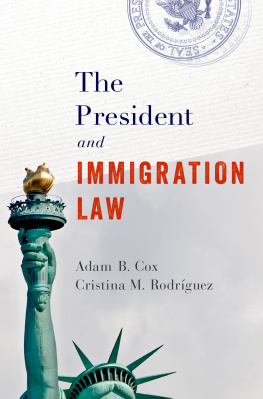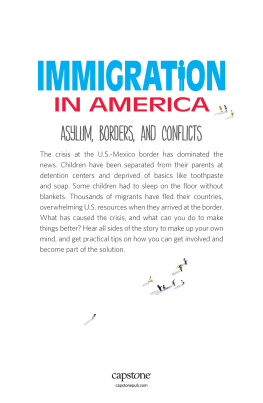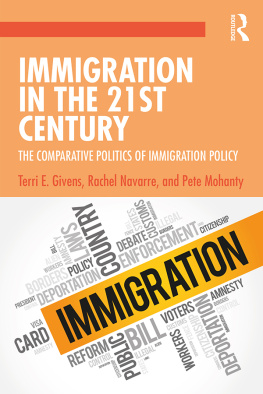Contents

All-American Nativism

The Jacobin series features short interrogations of politics, economics, and culture from a socialist perspective, as an avenue to radical political practice. The books offer critical analysis and engagement with the history and ideas of the Left in an accessible format.
The series is a collaboration between Verso Books and Jacobin magazine, which is published quarterly in print and online at jacobinmag.com.
Other titles in this series available from Verso Books:
Utopia or Bust by Benjamin Kunkel
Playing the Whore by Melissa Gira Grant
Strike for America by Micah Uetricht
The New Prophets of Capital by Nicole Aschoff
Four Futures by Peter Frase
Class War by Megan Erickson
Building the Commune by George Ciccariello-Maher
Peoples Republic of Walmart
by Leigh Phillips and Michal Rozworski
Red State Revolt by Eric Blanc
Capital City by Samuel Stein
Without Apology by Jenny Brown
All-American Nativism
How the Bipartisan War on Immigrants
Explains Politics as We Know It
DANIEL DENVIR

First published by Verso 2020
Daniel Denvir 2020
All rights reserved
The moral rights of the author have been asserted
1 3 5 7 9 10 8 6 4 2
Verso
UK: 6 Meard Street, London W1F 0EG
US: 20 Jay Street, Suite 1010, Brooklyn, NY 11201
versobooks.com
Verso is the imprint of New Left Books
ISBN-13: 978-1-78663-713-0
ISBN-13: 978-1-78663-711-6 (UK EBK)
ISBN-13: 978-1-78663-712-3 (US EBK)
British Library Cataloguing in Publication Data
A catalogue record for this book is available from the British Library
Library of Congress Cataloging-in-Publication Data
A catalog record for this book is available from the Library of Congress
Typeset in Fournier MT by Hewer Text UK Ltd, Edinburgh
Printed and bound by CPI Group (UK) Ltd, Croydon CR0 4YY
CONTENTS
Were going to build a wall We dont have a country anymore.
Donald Trump, April 28, 2016
On January 27, 2017, a week into his presidency, Donald Trump made partially good on his campaign pledge to effect a total and complete shutdown of Muslims entering the United States until our countrys representatives can figure out what the hell is going on, banning immigrants and visitors from seven majority-Muslim countries from entering the United States for 90 days. He also suspended the entry of refugees from everywhere for 120 days and prioritized the resettlement of persecuted religious minorities, by which Trump meant Christians.
That Trump had promised a Muslim ban in his barnstorming mega-rallies didnt make its enactment any less shocking. Even lawful permanent residents were initially blocked from boarding planes to the United States or refused entry once they had arrived. Protesters flooded into airports, lawyers rushed to court to file emergency motions, and Trump was swiftly dealt the first in a series of defeats as judges around the country put the ban on hold. It demonstrated, liberals swooned, the importance and resilience of institutions and the rule of law. At least until June 2018, when the Supreme Court voted to uphold the third version of his executive order, which narrowed the ban but made it indefinite, concluding that Trumps unambiguous bigotry had been duly laundered by way of bureaucratic procedure.
Despite Trump having proclaimed that he was motivated by anti-Muslim animus, the conservative majority ruled that the bans final version passed muster because it had been administratively justified in the language of national security. Trumps language had seemingly broken with establishment precedent. But, as his lawyers persuasively argued, his policies had not. Racist policy in post-1960s America was perfectly legal if it was called something else. One of Trumpisms achievements was to resist the pretense of doing so.
Even today, that Trump is actually president is still hard for many to accept or, more basically, to comprehend. But for supporters, Trump was telling basic truthstruths that elites from both major parties had long denied and even covered up. He was doing bold things that his predecessors had been afraid to do because they were too weak, corrupt, compromised. The United States, he said, had been sold out by its leaders. They exported American jobs to foreign countries and imported foreign workers to steal jobs at home. They sacrificed American blood and treasure in futile wars for other peoples freedom, spent hard-earned taxpayer dollars on a global welfare scheme called foreign aid, and, too politically correct and squeamish, failed to protect our people from terrorism and immigrant criminality.
Once in office, Trump rendered in administrative and legislative prose a nativist presidential campaign suffused with the toxic poetry of race, nation, and religion. Trump had won by portraying a country under siege from a globalist elite that prioritized themselves and the interests of a foreign-born underclass over those of forgotten white Americans. Trump, rambling through speeches that seemed incoherent to detractors, expertly struck a resonant chord with millions. And whenever the crowd grew restless, he snapped them back to attention with a phrase that summarized it all: Build the wall. Nothing tied his multifarious warnings of criminal, economic and even existential threat together as tightly as immigration. His subsequent success in transforming anti-immigrant vitriol into a perfectly legal Muslim ban provides a clue to an unsettling truth. Far from an anomaly, Trumps rhetoric and policies alike draw on and expose a deep well of all-American nativism. He was, detractors charged, simply un-American. But that was far from the case. The revulsion Trump inspires among liberal elites is rooted not just in the fear of the unfamiliar; theyre also shaken by the even more disturbing encounter with the uncanny.
Trump shattered political norms by launching vicious personal attacks and stating obvious lies frequently and without shame. 2016 was a year zero for American politics, establishment critics believed. An indecorous, authoritarian cartoon character, leading an army of extremist rednecks, threatened the rule of law as we knew it.
There is some truth to these caricatures. But the historical reality is less comfortable. Trumpism was the result of American politics at its most normal. It was also the logical conclusion of a decades-long trajectory. This is nowhere truer than with the long-standing bipartisan agreement that immigration is a problem in urgent need of solving. For decades, hard-core xenophobia had seeped into conservative politics, transmitted across an ascendant network of right-wing television, radio and, ultimately, internet outlets. Republicans and Democrats, facing a series of insurgencies on the right, provided ideological cover to a constellation of stridently anti-immigrant organizations and constructed an enormous machinery of repression. Escalating deportations, crackdowns that would explode the populations of jails, detention centers and prisons, restrictions on public benefits, the erection of hundreds of miles of fencing, and the deployment of thousands of agents to the border with Mexico were together intended to convince Americans that the immigrant threat was under control. Instead, these actions manufactured the threat and made it seem all the more real.











